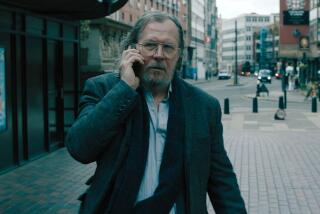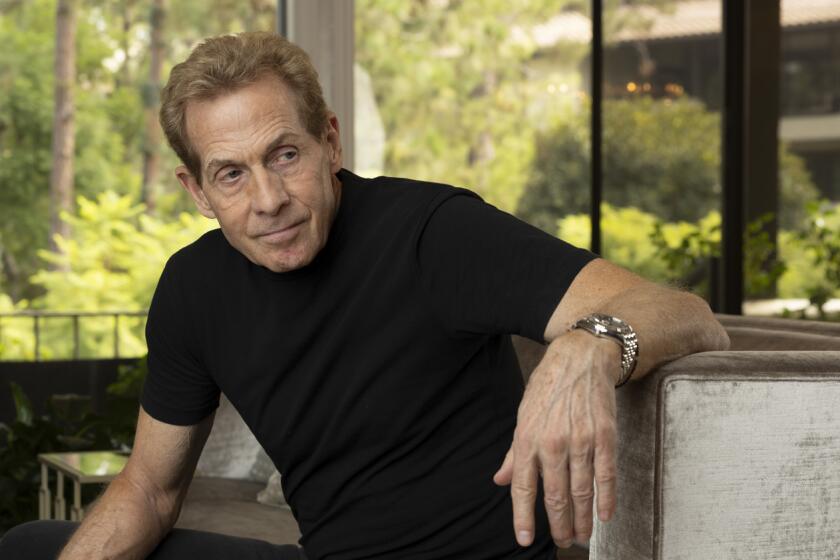Column: The never-ending appeal of the British Bad Guy

Though he has not yet been given his own detective series, Rory Kinnear is a deeply British actor. He’s done Shakespeare and “Cranford,” “The Thick of It” and James Bond. He’s played Frankenstein’s monster in “Penny Dreadful,” Tolkien’s Tom Bombadil in “The Lord of the Rings: The Rings of Power,” Winston Churchill in “The Ministry of Ungentlemanly Warfare,” twin pirates in “Our Flag Means Death” and 10 different creepy English villagers in Alex Garland’s horror fable “Men.”
And now he has entered one of film and television’s most beloved societies: the Order of the British Bad Guy.
You know the British Bad Guy. He’s the one with the Oxford accent and amusing tales who hands around the port and cigars while he plots the hero’s demise. The ruthless military officer with the monocle and the swagger stick who sends his men to senseless death and/or turns traitor. The aristocrat who still mourns the “loss” of India, who shields his crimes and dirty laundry beneath the Official Secrets Act. The young MI5 officer or financial broker who will lie, cheat and steal to protect his position.
He is the worst. Warm or cold, charming or sneering, gazing down from society’s top rung or desperately trying to get there, he is the craven soul of a corrupt social system.
And this year, Rory Kinnear got to play him. Twice.
FX’s adaptation of Patrick Radden Keefe’s bestselling book focuses on the Price sisters and raises questions about how a bitterly divided country can move on from the past.
In Netflix’s “The Diplomat,” Kinnear is (fictional) Prime Minister Nicol Trowbridge, an ambitious and mercurial man-child who might seem laughable if, as the second season unfolds, he wasn’t so often menacing (and, you know, prime minister).
In “Say Nothing,” FX’s adaptation of Patrick Radden Keefe’s nonfiction book about the most violent era of the Troubles in Northern Ireland, he steps in as Gen. Frank Kitson, the real-life officer tasked with quelling the Irish Republican Army with a variety of counterinsurgency tactics in the 1970s. There is nothing remotely laughable about Kitson. Drawing on his use of brutality in Kenya, he uses torture to cultivate informers, who were then often executed by the IRA. “We’re either getting vital information,” he raps out in justification, “or we’re driving them to murder their own men. Either way we win.”
Though different in many ways, both roles require the hallmarks of the male British villain: posh accent, exquisite enunciation, perfect posture and a bland stare that, what with the gimlet eyes and air of silently roiling menace, becomes more glacial as the silent minutes pass.
Also, an endless capacity for ruthlessness.
In film and television, Nazis, historic and contemporary, remain the ultimate villain, but we really love to hate the British Bad Guy.
Many are quite handsome: See Jason Isaacs as Lucius Malfoy in the “Harry Potter” series of films or in Netflix’s “The OA”; Rufus Sewell as the jealous knight in a “A Knight’s Tale” or an American Nazi in “The Man in the High Castle”; Samuel West as the traitorous Anthony Blunt in “The Crown” or a corrupt member of Parliament in “Slow Horses.”

Even the most brutish of them — Tobias Menzies as Captain Jack Randall in “Outlander,” Jeremy Irons’ Adrian Veidt in “Watchmen” — are mesmerizing in their self-confidence. How, we wonder, can they be so bottomlessly bad?
Possessing a round and pleasant face, Kinnear does not, at first glance, seem the obvious next initiate into a society that favors the more chiseled mien. But, as in “Men,” Kinnear’s appearance of placidity makes his characters’ nefarious tendencies even more chilling; his ability to draw his mouth into a grim implacable line is second to none.
And there really is no physical requirement for entry. Though far from physically imposing, Tom Hollander took the brotherhood to new heights as the cold-blooded Lord Cutler Beckett in the second and third “Pirates of the Caribbean” films (he has the meme to prove it), only to bring it downmarket as Lance “Corky” Corkoran in “The Night Manager.”
Talent, of course, is one of the main reasons certain actors make such convincing villains. Mark Strong, so menacing in “Young Victoria” and “Sherlock Holmes” — and as an American baddie in “The Penguin” — is Merlin the good guy in the “Kingsman” franchise and, at least so far, a watchful and anxious Emperor in “Dune: Prophecy.” Menzies pulled off two sides of the coin in “Outlander” —the loving, then grieving husband Frank alongside the horrific Black Jack — as well as a weary Prince Phillip in “The Crown.”
But certainly the accent helps. There’s a reason that Benedict Cumberbatch voiced the dragon Smaug in “The Hobbit,” and it’s the same reason Irons voiced Scar in “The Lion King” and George Sanders, BBG emeritus, played Shere Khan in “The Jungle Book.”
The actor discusses how she was able to tap into the news and the presidential election for her role on the Netflix series, which featured a surprising twist in the Season 2 finale.
There’s something about the well-educated British accent that can seem, to American ears, both soothing and slightly sinister. Charm is, in many ways, a misdirection.
Even the Brits know that. In “Slow Horses,” those with the plummiest accents are almost always the least trustworthy. Gary Oldman’s Jackson Lamb speaks pure London, while West plays his oily Home Secretary Peter Judd high posh.
In both “Say Nothing,” and “The Diplomat,” Kinnear’s accent serves to separate his characters from the shows’ protagonists — various members of the IRA in the former and U.S. ambassador to the U.K. Kate Wyler (Keri Russell) in the latter. (Sewell, who plays Kate’s husband, Hal, is neutered by an American accent but still keeps things interesting with a BBG-lite, “dark horse” vibe.)
Though “Say Nothing” is a limited series, “The Diplomat” will be back for Season 3, and so will Kinnear’s Trowbridge. Whether the prime minister will find redemption or sink into BBG infamy remains to be seen. But having proved himself in this very British subgenre, as in so many other types of roles, Kinnear does risk the danger, as Sewell, Strong and others have faced, of being typecast.
Or someone could do the most British next thing and write him a nice detective series.
More to Read
The complete guide to home viewing
Get Screen Gab for everything about the TV shows and streaming movies everyone’s talking about.
You may occasionally receive promotional content from the Los Angeles Times.









